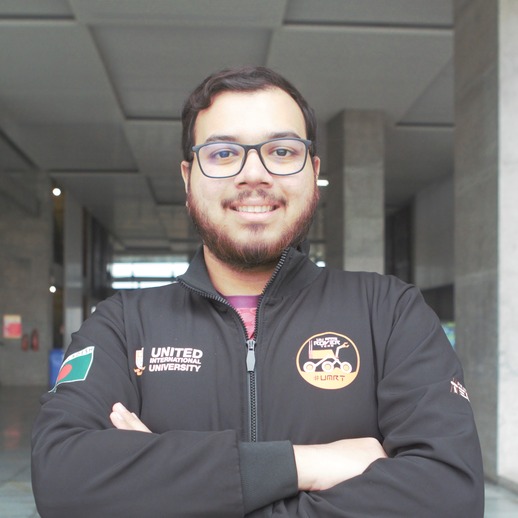About
I am currently working as Research Engineer with the Faculty of Science and Engineering at Green University of Bangladesh (June 2024 - Ongoing) currently working with optimization of Retrieval Augmented Generation (RAG) models. Moreover, I have initiated and currently directing the Green University Mars Rover Team under Artificual Intelligence and Robotics Applications Lab (AIRA Lab).
I am a CSE graduate from United International University (UIU), having earned my BSE (2018-2023) in CSE, Data Science. Throughout my academic journey, I have cultivated a fervent passion for robotics and artificial intelligence.
My path has been marked by significant achievements, including my leadership role within the Software and Autonomous team of the highly competitive UIU Mars Rover Team. Additionally, I developed the rover's current Autonomous framework and GUIs, which played a pivotal role in achieving success in prestigious international competitions such as the University Rover Challenge-2022,2023 and Anatolian Rover Challenge-2023, world ranking - 13th, 9th and 3rd respectively. We are also Champions in Asia at URC-2022,2023.
In the realm of research, my expertise spans diverse fields, encompassing Robotics, Meta-Learning, Machine Learning, and Computer Vision. More details can be found in the research section.
More details can be found in my curriculum vitae .
Research and Publications
Published Conference Articles
-
Meta-Learning in Supervised Machine Learning
14th Int'l Conference on Software, Knowledge, Information Management and Applications (SKIMA)Abdullah Al Masud ,Sabbir Hossain ,Muhsina Rifa ,Farhana Akter ,Akib Zaman , andDewan Md Farid In the present digital era, a popular use of Machine learning is knowledge mining from big data. Machine learning is the sub-branch of Artificial Intelligence (AI) that extracts rules automatically from Big Data for decision-making to build expert systems. Meta-Learning is a sub-branch of machine learning, which uses machine learning classifiers that learns to map and combine predictions and information of data of other ML-models in the field of ensemble-learning. Meta-learning helps us to select the best/right learning algorithms to solve a particular problem. It maps from the meta-data of other machine learning algorithms by evaluating it on different datasets. In this paper, we have presented very recent state-of-the-art research works on meta-learning. We have categorized meta-learning on supervised learning data sets into three categories: (1) Task Independent Recommendation, (2) Configuration Space Design, and (3) Configuration Transfer, and reviewed the recent works on each category.
2022
Research (In-progress)
-
Xpert: An End-to-End Algorithm Recommender System for Supervised Dataset Undergraduate thesis
Abdullah Al Masud,Sabbir Hossain ,Muhsina Rifa ,Farhana Akter ,Akib Zaman andDewan Md Farid Summary of WorkIn this paper, we present a novel framework that addresses these challenges using Meta-Learning, a branch of machine learning that extracts information about data to support a decision-making problem with the data. The framework presented in this paper aims to provide an efficient solution for selecting the most appropriate algorithm with 86% accuracy, given information about data along with some derived information of dataset to optimize the training process with limited time and computational resources.
Journal
-
Collaborative AI for Validity of Cancer Classification
Digital Image Processing Course
Abdullah Al Masud, andFahad Al Islam Summary of WorkCollaborative AI has blossomed with the advances in AI. However, due to its validity, there remain challenges in integrating cancer classification models as a support system for oncologists. Therefore, we interviewed 17 specialists from the USA and Bangladesh to understand the factors affecting this integration. In this study, we developed a deep learning model that reasons with the identification of cancer classified from sample images.
Journal
-
Development of a Mars Rover Prototype: Autonomous Navigation and Life Exploration
Center of Artificial Intelligence and Robotics (CAIR) | UIU MARS ROVER
Summary of WorkThis study conducts a thorough requirement elicitation for a human helper rover, establishing a subsystem-level framework to showcase planetary exploration capabilities in URC 2022. Based on URC 2022's requirements, the rover system is divided into seven subsystems, with five addressing fundamental functionality and two being mission-specific and modular. The research progressively integrates these subsystems, evaluating performance through scenario-based tests that require fine-grained end-effector control. Assessment criteria include resilience, navigability, traversability, and mechanical qualities. The rover, equipped with an autonomous navigation system, travels independently to a target location by localizing and calculating a route. Additionally, a novel life exploration subsystem detects life in soil and rock samples.
Journal
Work Experience
-
Research Engineer, Faculty of Science and Engineering(FSE)
Green University of Bangladesh
June 2024 - ongoing
-
Researcher
Center of Artificial Intelligence and Robotics (CAIR)
August 2023 - April 2024
-
Undergraduate Teaching assistant
Electrical and Electronics Engineering, United International University
Spring(January) 2019 - Summer(May) 2020
-
Publication and Organizing team
Asia-Oceania Congress of Medical Physics (AOCMP-2021)
December 2021
